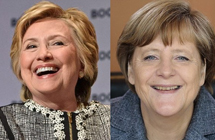专家:宽脸女人是天生赢家
|
Scientists have discovered that a hidden indicator of a woman’s motivation to dominate lies in the shape of her face – and that women with wider faces, such as the German Chancello Angela Merkel, US presidential candidate Hillary Clinton and chart-topping singer Sophie Ellis-Bextor, are simply more power-hungry. Comedian Frank Skinner came in for criticism when, as host of the 2002 Brit Awards, he welcomed Miss Ellis-Bextor to the stage with the quip: ‘Why the wide face?’
She brushed the comment aside in a strong response said to be typical of such women, who subconsciously desire more power and influence, and are more likely to be successful, according to the research. Psychologists at Friedrich-Alexander University in Bavaria, Germany, investigated the effects of the intense hormonal activity in the brain and the growing body during puberty. The theory is that such changes help shape facial bones and work on developing the areas of the brain relating to motivation and behavior. They measured face width and height, and calculated the ratio of the distance between the left and right cheekbones to the distance between the upper lip and brow. They called the measurement the facial width-to-height ratio or fWHR. Higher ratios, allocated to people with wider faces, are considered more masculine, while lower ratios are more feminine. Researchers then carried out tests on 213 subjects to measure a psychological phenomenon known as the ‘implicit need for power’ or nPower, a predisposition that works subconsciously. The results showed links between fWHR and the desire for power – but only in women. ‘This finding was unexpected since fWHR is commonly linked to males,’ said behavioral scientist Kevin Janson, who led the research.‘Our results point to a refinement of the female brain during puberty that is driven by high levels of hormones.’ He said Angela Merkel was a ‘very good example’ of someone meeting the criteria and that Margaret Thatcher, the most powerful female politician in British history, also had ‘broader features’. |









